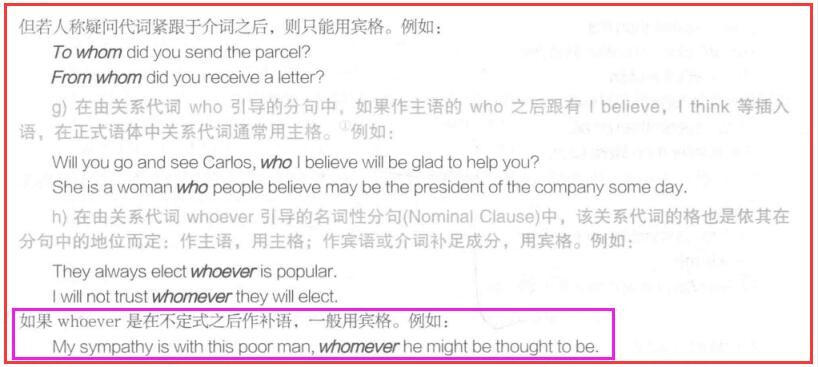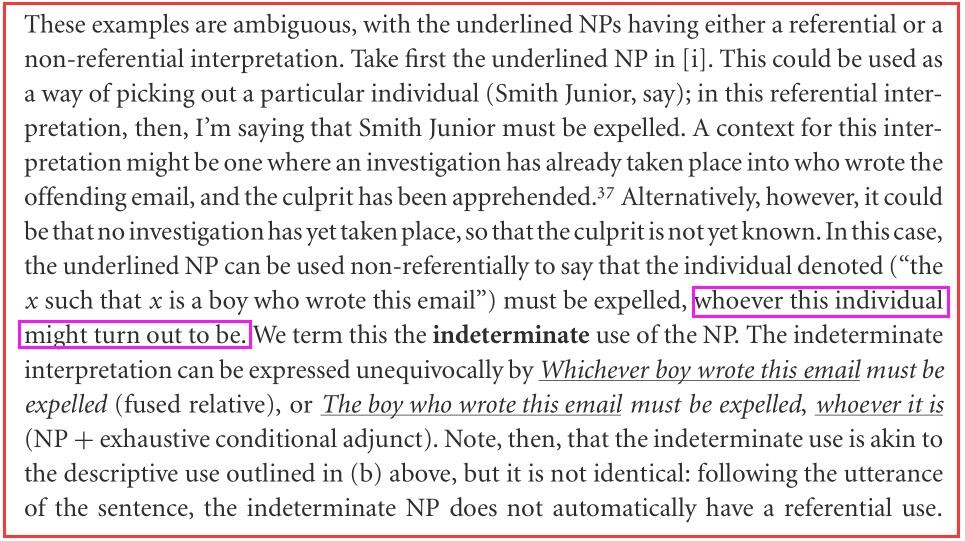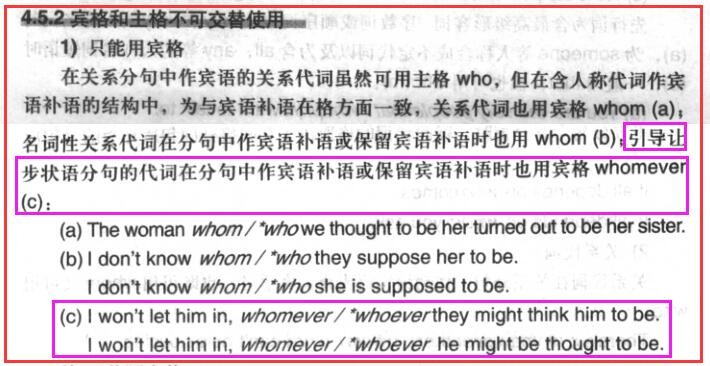5 引导让步从句用 whoever 还是 whomever
I
don't want to see him, ______ he might be thought to be.
A. whoever B. whomever
请问专家老师如何选?同时麻烦分析一下原因。谢谢!
最佳答案 2024-09-30 22:54
前面几位老师都做了很好的分析。我补充引用几个观点,仅供网友参考!
章振邦主编的《新编英语语法教程》(第五版,学生用书)第96页有如下说明:
如果 whoever 是在不定式之后作补语,一般用宾格。例如:
My sympathy is with this poor man, whomever he might be thought to be.
附相关截图:

但是,在 Rodney Huddleston 的 The Cambridge Grammar of the English Language 中搜索到一句用于不定式后作补语用 whoever 的例子(p403):
In this case, the underlined NP can be used non-referentially to say that the individual denoted (“the x such that x is a boy who wrote this email”) must be expelled, whoever this individual might turn out to be.
附相关截图:

但对于这个问题,张克礼在其《新英语语法》中是这样分析的:引导让步状语分句的代词在分句中作宾语补语或保留宾语补语时也用宾格 whomever (p88):
I won’t let him in, whomever / *whoever they might think him to be.
I won’t let him in, whomever / *whoever he might be thought to be.
附相关截图:

张克礼老师认为:他给出的两个句子之所以要用宾格形式的 whomever,目的是为了保持与句中的宾格代词 him 在格上保持一致(第二句是第一句的被动语态形式,宾格 him 变成了主语)。注意,张克礼老师的例句与章振邦老师的例句高度相似。网友的句子也与之高度相似。
如果觉得我的回答对您有用,请随意打赏。你的支持将鼓励我继续创作!

其它 2 个回答
也倾向于选择whoever。
我觉得,可以从几部主流词典对whomever的英文释义寻找一下思路:
《柯林斯英语词典》: whomever a formal word for whoever when it is the object of a verb or preposition
《牛津高阶英语词典》: (literary) used instead of 'whoever' as the object of a verb or preposition
《剑桥高阶英语词典》:whoever when used as the object
从英文释义可知,几部词典都认为,使用whomever时,需作动词或介词的宾语。而问题句中的不定式to be一般会解释为主语补语,不定式层级内所缺少的应该是表语,而whomever一般作动词或介词的宾语,所以应该使用whoever。列举3句whoever作表语的实例(摘自柯林斯和朗文词典):
1. Everybody who goes into the region, whoever they are, is at risk of being taken hostage.
2. You've got a message from Tony Gower, whoever he is.
3. This man, whoever he is, must be very clever.
此外,我觉得,也可以把whoever和whomever分别转换为no matter who和no matter whom进行辨别。至于whom的使用场合,也可参考柯林斯词典:whom is used in formal or written English instead of 'who' when it is the object of a verb or preposition,所以,一般可能会这样说:
I don't want to see him,no matter who (*whom) he might be thought to be.
个人理解,仅供参考。
- 2 关注
- 2 收藏,1289 浏览
- 陈书国 提出于 2024-06-07 16:42
相似问题
- whoever 和 whomever 引导状语从句时是代词还是连词 2 回答
- 如何搞清楚whoever是复合关系代词还是引导让步状语从句的疑问 1 回答
- whomever作宾语 1 回答
- Whoever使用含义辨析 1 回答
- whoever和who的问题 1 回答
-
 《高考英语备考1号·速效编》
《高考英语备考1号·速效编》
-
 《高考英语备考1号·写作编》
《高考英语备考1号·写作编》
-
 《高中英语晨读晚记》
《高中英语晨读晚记》
-
 《高中英语错题笔记》
《高中英语错题笔记》
-
 《零起点考大学英语》
《零起点考大学英语》
-

